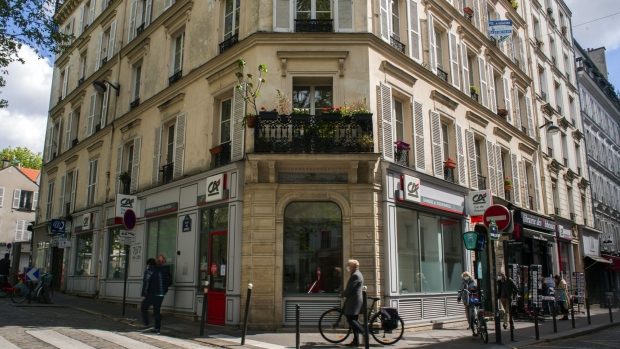Nov 10, 2022
Credit Agricole Regional Owners to Boost Stake by $1 Billion
, Bloomberg News

(Bloomberg) -- Credit Agricole SA said its regional-bank shareholders would buy up to €1 billion ($1 billion) of the lender’s shares by the first half next year, in a move that takes advantage of depressed prices amid worries over the economic outlook.
The Paris-based bank said the regional lenders, through the holding entity SAS Rue La Boetie, would increase their stake to not more than 65% of its shares, instead of roughly 57% today. Credit Agricole made the announcement Thursday alongside mixed third-quarter results, in which net income beat expectations, while its CET1 ratio, a key measure of financial strength came in lower than expected.
Given the undervaluation of European banks, the regional-bank owners are like “an astute shareholder,” investing in the lender on account of “its performance, its solidity and its development potential,” Chief Executive Officer Philippe Brassac said in a call with reporters.
Credit Agricole shares fell as much as 5.8% in early Paris trading and were down 4.9% as of 9:24 a.m., bringing this year’s decline to about 26%.
Russia’s invasion of Ukraine weighed on Credit Agricole’s earnings earlier this year, leading the lender to progressively wind down its exposure to the region and adopt a cautious stance in its new medium-term financial objectives. This doesn’t mean the bank abandoned all growth ambitions, as it eyes insurance operations in Italy and is in talks with Worldline SA for a potential partnership in payments, Bloomberg News has reported.
What Bloomberg Intelligence says:
The €1 billion plan by Credit Agricole’s regional-bank holding company -- to increase its stake to 65% (from about 57%) in Credit Agricole SA -- will provide technical support to mid-2023, but reflects the malaise around the stock due to mixed results and a tough outlook. A big CET1 miss, 2% revenue underperformance and in-line costs at 3Q are disappointing, though cost of risk was much better than expected.
-- Jonathan Tyce, BI banking analyst
CredAg’s €1 Billion Support vs. Mixed 3Q Is a Fine Line: React
The performance of the corporate and investment bank unit came in just below analyst estimates, in a volatile quarter that saw the trading units at French peers BNP Paribas SA and Societe Generale SA beat expectations.
Deputy Chief Executive Officer Xavier Musca, who also heads the lender’s investment banking operations, said that a 5.7% decline in trading underlying revenue can be explained by the fact that Credit Agricole doesn’t have any presence in commodities trading, and a limited one in equity derivatives, two areas that sustained peers’ gains. The sharp decline in debt capital markets activities, which Credit Agricole houses in the same unit, also weighed on its revenue, Musca said.
Still, the bank saw an increase of 7.9% in interest rate and foreign exchange products, as currency volatility and interest-rate increases led corporations to review their hedging strategies.
Looming recession concerns led the bank to book more than a third more in provisions than a year ago. With €360 million set aside to cover potentially souring loans, Credit Agricole was still less cautious than analysts anticipated.
Caution Warnings
Euro-area regulators have warned banks to exercise caution with regard to provisions and cash returns to investors this year. Other European lenders are becoming less sanguine about the risks ahead, with Deutsche Bank AG and Banco Santander SA starting to stash away more.
Banks across Europe are also voicing their frustrations over the supervision of the ECB, which some see as excessive interference and unreasonable demands.
The SSM’s effort to supervise lenders with different sizes and business models across Europe can translate into “bureaucratic approaches,” Deputy CEO Jerome Grivet said in an interview with Bloomberg TV Thursday.
Rising interest rates have yet to translate into a significant boost for Credit Agricole’s retail operations. Its domestic network LCL saw revenue flat, at €940 million. The French market for mortgage loans, which have fixed rates, hasn’t allowed local lenders to post significant gains in their net interest income. Credit Agricole’s international retail unit revenues, at €804 million, were up 1.2% in the quarter.
The bank, which acquired Credito Valtellinese SpA last year, has further ambitions in Italy. Credit Agricole bought a 9.2% stake in Banco BPM SpA earlier this year, and is now looking to acquire a stake in the Italian lender’s insurance business. The process, in which the bank remains committed, is still ongoing, Grivet said.
Still, the bank is “very confident” about the outcome of the talks with Banco BPM, as it has the capacity to develop Banco BPM’s insurance business in Italy, both through Credit Agricole Italia and third party networks, Grivet said on Bloomberg TV.
Rising rates and sinking markets proved more challenging for Amundi SA, Credit Agricole’s investment arm. Last month, the asset manager posted larger than anticipated outflows, and its assets under management fell for the third quarter in a row, losing 1.6% to €1.9 trillion.
--With assistance from Anna Edwards and Mark Cudmore.
(Updates with details, Deputy CEO comments from third paragraph)
©2022 Bloomberg L.P.






